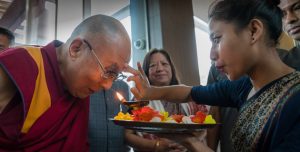
His Holiness the Dalai Lama in Guwahati on the first day of his three day visit to the state of Assam on April 1.
Photo: OHHDL
His Holiness the Dalai Lama is visiting Assam and Arunachal Pradesh from April 1 to 12. His trip to Arunachal Pradesh, which will include teachings at the famous Tawang monastery, has caused consternation in China, which claims the region as being part of south Tibet.
The status of Arunachal Pradesh has been a source of diplomatic tension between China and India for over a century. In 1914, the British signed the Simla accords with the Tibetans, creating the McMahon Line as the boundary between India and Tibet. The accords were rejected by the Chinese government at the time but today this line still acts as the border between China and India. The current Chinese administration considers the McMahon Line to be an illegal incursion into Chinese territory.
For fear of agitating the Chinese, the Indian government has historically adopted a cautious approach towards Arunachal Pradesh, but current Prime Minister Narendra Modi has been combative in staking India’s claim to the territory. He visited the state himself in 2015 and his sanctioning of the Dalai Lama’s tour with the state government as His Holiness’ hosts marks a departure from prior administrations. For their part, the Chinese government warned before the trip that it would cause “serious damage” to bilateral relations if it were to go ahead.
The controversy surrounding the Dalai Lama’s visit has propelled the story into the national news. An article in The Times of India speculated that the visit could be used by the Indian government to create diplomatic leverage with the Chinese on issues at the UN that they are currently vetoing, such as India’s entry into the Nuclear Suppliers Group and moves to bring Pakistan-based terror mastermind Masood Azhar under UN sanctions. The Hindustan Times stuck to a more official tone, stating in an article that the Indian government had no right to place restrictions on the Dalai Lama’s movements within India and that his visit to Arunachal Pradesh was simply a religious tour.
For his part, as is his custom, the Dalai Lama has so far steered away from discussions of international diplomacy during his tour. On April 2, in Guwahati, Assam, he spoke to an ardent crowd of around 400 Tibetans about the importance of maintaining the countries’ cultural traditions whilst in exile and paid tribute to the Tibetans still in Tibet whom he said remained “steadfast and resolute”.




 Print
Print Email
Email